

Craig Venter. Early life and education[edit] Venter was born in Salt Lake City, Utah, the son of Elizabeth and John Venter.[6] In his youth, he did not take his education seriously, preferring to spend his time on the water in boats or surfing.[7] According to his biography, A Life Decoded, he was said to never be a terribly engaged student, having Cs and Ds on his eighth-grade report cards.[8] He graduated from Mills High School in Millbrae, California.
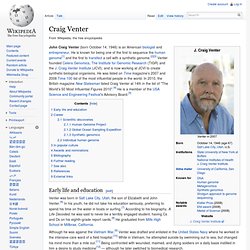
Although he was against the Vietnam War,[9] Venter was drafted and enlisted in the United States Navy where he worked in the intensive-care ward of a field hospital.[10] While in Vietnam, he attempted suicide by swimming out to sea, but changed his mind more than a mile out.[11] Being confronted with wounded, maimed, and dying soldiers on a daily basis instilled in him a desire to study medicine[12] — although he later switched to biomedical research. Hamilton O. Smith. About Biographies Hamilton O.
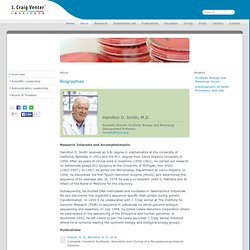
Smith, M.D. Scientific Director Synthetic Biology and Bioenergy Distinguished Professor Research Interests and Accomplishments Hamilton O. Subsequently, he studied DNA methylases and nucleases in Haemophilus influenzae Rd and discovered this organism's sequence-specific DNA uptake during genetic transformation. Publications Gibson, D. Science. 2008 Jan 24; 319(5867): 1215-20.
Drew Endy. Andrew (Drew) David Endy (born 1970) is a synthetic biologist and Assistant Professor of bioengineering at Stanford University, California.[2][3][4][5][6][7][8] Education[edit] Endy received his PhD from Dartmouth College in 1997 for his work on Genetic engineering using T7 phage.[9] Research[edit] Endy was a junior fellow for 3 years and later an Assistant Professor in the Department of Biological Engineering at MIT.
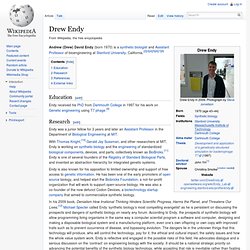
Endy is also known for his opposition to limited ownership and support of free access to genetic information. In his 2009 book, Denialism How Irrational Thinking Hinders Scientific Progress, Harms the Planet, and Threatens Our Lives,[12] Michael Specter called Endy ‘synthetic biology’s most compelling evangelist’ as he is persistent on discussing the prospects and dangers of synthetic biology on nearly any forum. Frances H. Arnod. Stanislas Leibler. Even the simplest of organisms, such as bacteria, are capable of processing information in a highly sophisticated manner, adapting to varying environments and evolving new functions.
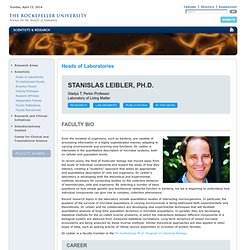
Dr. Leibler is interested in the quantitative description of microbial systems, both on cellular and population levels. In recent years, the field of molecular biology has moved away from the study of individual components and toward the study of how they interact, creating a “systemic” approach that seeks an appropriate and quantitative description of cells and organisms. Dr. Leibler’s laboratory is developing both the theoretical and experimental methods necessary for conducting studies on the collective behavior of biomolecules, cells and organisms. Recent research topics in the laboratory include quantitative studies of interacting microorganisms. Dr. Dr. Charles Cantor. Professor Emeritus, Biomedical Engineering Professor of Pharmacology, School of Medicine Ph.D., Biophysical Chemistry, University of California, Berkeley A.B., Chemistry, Columbia University Curriculum Vitae Email: crcantor@bu.edu Dr.
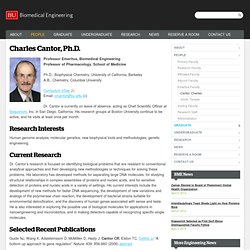
Ron Weiss. Michael B. Elowitz. Like the flickering green bacteria in one of his best known experiments, Michael Elowitz is a leading light in the field of synthetic biology.
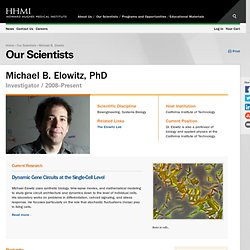
In 2000, Elowitz broke open the fledgling science, which is concerned with understanding and building genetic circuits, by programming E. coli bacteria to blink like Christmas lights. The bacteria glow green after three genes in a looped sequence repress the next, one by one, and then spark a gene that turns on a fluorescent protein. After the circuit runs its course, the bacteria stop making the fluorescent protein and turn off until the cycle repeats.
"It's like a game of rock-paper-scissors," says Elowitz, who did the work with his adviser Stanislas Leibler. "You have three genes, and each one represses the next one. " Biologists told Elowitz the experiment wouldn't work—you can build and insert a new genetic circuit into living bacteria, but its behavior would be unpredictable. "I thought it had to work," says Elowitz. James Collins (Boston University) James J.
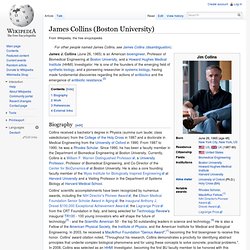
Collins (June 26, 1965) is an American bioengineer, Professor of Biomedical Engineering at Boston University, and a Howard Hughes Medical Institute (HHMI) Investigator. He is one of the founders of the emerging field of synthetic biology, and a pioneering researcher in systems biology, having made fundamental discoveries regarding the actions of antibiotics and the emergence of antibiotic resistance.[2] Collins received a bachelor's degree in Physics (summa cum laude; class valedictorian) from the College of the Holy Cross in 1987 and a doctorate in Medical Engineering from the University of Oxford in 1990. From 1987 to 1990, he was a Rhodes Scholar. Since 1990, he has been a faculty member in the Department of Biomedical Engineering at Boston University. Collins' scientific accomplishments have been recognized by numerous awards, including the NIH Director's Pioneer Award, the Ellison Medical Foundation Senior Scholar Award in Aging, the inaugural Anthony J.